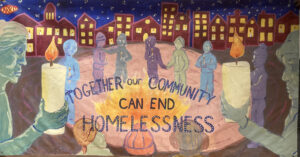“If you can’t get what you need, we’re here,” was the message Joe Kreisler wanted people experiencing poverty to hear when he founded High Street Resource Center (the organization that evolved into Preble Street) in 1975.
For 50 years, Preble Street has been here – expanding far beyond a handful of social work interns in Portland to more than 325 full and part-time staff and programs that touch every county in Maine. “Preble Street takes our mission seriously, and we never, ever forget that the most important part of social work is always the person standing directly in front of us,” says Andrew Bove, Vice President of Social Work, Preble Street. “True social work is about meeting someone where they’re at and building an authentic human connection.” Across the agency, we share Joe’s belief that “everyone has value, and everyone deserves someone to care about them.”
By April 2010, when Preble Street opened Florence House, a women’s shelter and Site-based Housing First Program, Preble Street had five facilities located within one square mile of each other. Fast forward to today – through the start of the opioid crisis, an international pandemic, and rising rates of unsheltered homelessness – and the scope of the work and impact of Preble Street has dramatically expanded. In the past 15 years, Preble Street has added offices in Bangor and Lewiston, enabling the agency to offer statewide services to Veterans and survivors of trafficking and to support youth experiencing homelessness in 11 out of 16 Maine counties. Preble Street has also partnered with medical providers to launch Maine’s first recuperative care program, added new programs to address the unsheltered homelessness crisis, expanded its Food Programs with a vision to ending hunger in Maine, and is on the verge of taking over operations of the Hope House Shelter in Bangor, its first 24-7 program outside of Portland.
The grand opening of
Florence House
Sign for the original High Street Resource Center
Mark Swann, Bruce Logan, and Joe Kreisler share a smile in the early 1990s.
“I see the work that Preble Street does in the context of what’s changed in the human service arena in the last 30 or 40 years,” says Mark Swann, Preble Street Executive Director. “There are a few reasons we are still here, when so many other organizations have closed their doors. One is that we stay true to our mission. Partnerships, especially those partnerships that help us advance towards a more equitable Maine, are as key to our future as they have been to our past.”
“We have built a lot of trust within our community, which leads to really impactful private funding support,” adds Swann. “That support has helped us to stay adaptable, flexible, and responsive in the face of new challenges. And by pivoting or expanding when needed, it’s helped us to develop new relationships, new possibilities, and new opportunities.”
Advocacy is a key component of social work and the Preble Street mission. “Social work is about relationships – our relationship with one another and our relationship with community,” shares Daniella Cameron, Preble Street Deputy Director. “It’s also about bringing people together to promote change through collective action and to address the inequities inherent in systems both large and small.”

Social workers advocate for clients every day as they help them access healthcare, housing, and social services. While this type of advocacy is extremely impactful for individual lives, it does not address the complex systemic problems that lead to hunger, homelessness, and poverty. By embedding advocacy for solutions to the Preble Street mission, we focus on challenging the unjust systems that create barriers for individuals. “For all of the complexity of the problems we are working on, what Preble Street does is relatively simple – we are addressing food insecurity and the need for shelter, housing, healthcare, and stability,” says Ali Lovejoy, Vice President of Mission Advancement.
“Preble Street solves these really big problems through advocacy, by developing partnerships or innovative programs, by investing in our dedicated staff, and thanks to the efforts of thousands of volunteers and donors over the past 50 years. We could not do what we do without the community’s support – which now includes the entire state.”

During an emotional presentation at the Second Preble Street Conference on Homelessness in October 2024, Michelle Ducas shared about the impact that Preble Street has had on her life.
“Today I stand here, two weeks away from being one year sober, and if I were still homeless while all of this happened…if not for the Housing First Program…if not for my friends, the staff at Huston Commons…
For 50 years, Preble Street has been driven to put compassion in action. And the agency is going to continue to do that, to meet the need and to meet people where they are. “We’re going to grow Site-based Housing First in Maine to end chronic homelessness. We’re going to work towards our goal of preparing up to 10,000 meals a day for food insecure Mainers across the state. And finally, we will soon be able to bring our youth shelter and day center together under one roof at Joe’s Place,” says Swann. “Knowing that we have the support of our community is what keeps me hopeful for the future and for a Maine where the most vulnerable people have their basic needs met.”
We do not know exactly what new challenges our communities, state, and nation will be facing in coming years. But we do know, as we head into our sixth decade as a social work agency committed to ‘empowering people experiencing problems with homelessness, housing, hunger, and poverty, and advocating for solutions to these problems,’ that we are preparing to meet those challenges. As Joe said, “If you can’t get what you need, we’re here.”

Doubling down on our mission in our 50th year
https://www.youtube.com/watch?v=j1j-w6NGTyc This short video reflects back on some of the impactful events of 2025 As I reflect on the 50th year of Preble Street, I’m struck by the contrasts. There was much cause for celebration — assuming operations of the Hope House low-barrier shelter in Bangor, the Grand Opening of the Food Security Hub, celebrating our

Annual Homeless Persons’s Memorial Vigil
VIGIL LOCATION CHANGE: Tonight’s Annual Homeless Persons’ Vigil has been moved to First Parish Portland Unitarian Universalist at 425 Congress Street, Portland. A candlelight procession will start at the MaineHealth-Preble Street Learning Collaborative, located at 20 Portland Street, at 4:30 pm and proceed to First Parish. Attendees are also welcome to gather inside First Parish beginning

Staff highlight: Rich Tucker – Helping clients move forward
Preble Street staff are #CompassionInAction, and we want you to get to know them! This month we’re introducing you to Rich Tucker, Housing Support Worker, Teen Services How long have you worked at Preble Street? And in your current program? I’ve been at Preble Street since November 2005, and with Teen Services for almost 4 years. What do you
